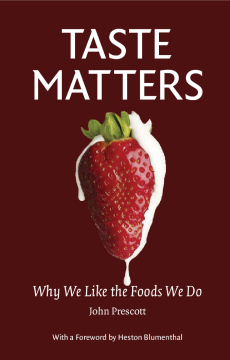
Additional Information
Book Details
Abstract
The human tongue has somewhere up to eight thousand taste buds to inform us when something is sweet, salty, sour, or bitter—or as we usually think of it—delicious or revolting. Tastes differ from one region to the next, and no two people’s seem to be the same. But why is it that some people think maple syrup is too sweet, while others can’t get enough? What makes certain people love Roquefort cheese and others think it smells like feet? Why do some people think cilantro tastes like soap?
John Prescott tackles this conundrum in Taste Matters, an absorbing exploration of why we eat and seek out the foods that we do. Prescott surveys the many factors that affect taste, including genetic inheritance, maternal diet, cultural traditions, and physiological influences. He also delves into what happens when we eat for pleasure instead of nutrition, paying particularly attention to affluent Western societies, where, he argues, people increasingly view food selection as a sensory or intellectual pleasure rather than a means of survival. As obesity and high blood pressure are on the rise along with a number of other health issues, changes in the modern diet are very much to blame, and Prescott seeks to answer the question of why and how our tastes often lead us to eat foods that are not the best for our health. Compelling and accessible, this timely book paves the way for a healthier and more sustainable understanding of taste.“Compellingly and comprehensively, Prescott reveals the cultural, genetic and physiological differences behind gustatory preferences. From the effects of a woman's Kalamata olive habit on her unborn child to the uncoupling of flavour and nutrition, this is a top-notch scientific smorgasbord.” — Nature
“Prescott runs a consultancy ‘in the area of food perceptions and preferences,’ and Taste Matters offers both a detailed analysis of that area and a broader examination of the psychology of eating. For example, he looks at why young children can be reluctant to try new foods, and what strategies parents might adopt in response, before expanding his inquiry to cover cravings, aversions, the external cues and psychological motivations that prompt us to eat, and why, once we've started, it can be so difficult to stop. . . . [His] hybrid approach frequently makes for fascinating reading.” — The Observer
“[A] fine book.” — Daily Mail
“John Prescott guides the reader through the latest research in this complex emergent field. His style is entertaining and confident, with technical language kept to a minimum. Taste Matters should satisfy the cravings of anyone, from the scholar wanting to get a handle on the latest findings to the parent wanting to know why their children won't eat their vegetables.” — Times Literary Supplement
“The strength of Prescott’s short book is in unpicking the complexities of our eating choices. . . . Full of fascinating detail.” — Financial Times
“An utterly absorbing account of how human food preferences are formed.” — Daily Telegraph
“I knew when Prescott’s new book, Taste Matters, arrived it would be, yes, hot. It is. As the title suggests, Prescott pulls together an enormous body of research to answer the basic questions about who likes or dislikes what and why. Evolution, culture, hedonism, disgust, inheritance, diversity and sweet, sour, bitter, salty and the mushroom-like taste of umami all play a role.” — The Australian
John Prescott is associate professor of psychology at the University of Newcastle, Australia, editor of Food Quality & Preference, and executive editor of Chemosensory Perception.
